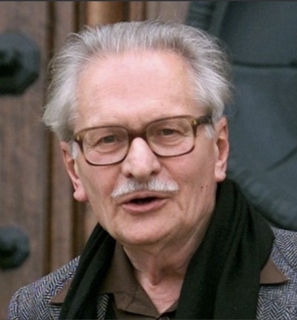 W
WGaston-Armand "Guy" Amaudruz was a Swiss neo-fascist political philosopher and Holocaust denier.
 W
WMaurice Bardèche was a French art critic and journalist, better known as one of the leading exponents of neo-fascism in post–World War II Europe. Bardèche was also the brother-in-law of the collaborationist novelist, poet and journalist Robert Brasillach, executed after the liberation of France in 1945.
 W
WAlain de Benoist – also known as Fabrice Laroche, Robert de Herte, David Barney, and other pen names – is a French journalist and political philosopher, a founding member of the Nouvelle Droite, and the leader of the ethno-nationalist think tank GRECE.
 W
WRené Binet was a French militant political activist. Initially a Trotskyist in the 1930s, he espoused fascism during World War II and joined the SS Charlemagne Division. Soon after the end of the war, Binet became involved in numerous neo-fascist and white supremacist publications and parties. He wrote the 1950 book Théorie du racisme, deemed influential on the European far-right at large. Binet died in a car accident in 1957, aged 44.
 W
WJean Renaud Gabriel Camus is a French novelist, conspiracy theorist and white nationalist writer. He is known as the creator of the "Great Replacement", a far-right conspiracy theory that claims that a global elite is colluding against the white population of Europe to replace them with non-European peoples.
 W
WRichard Nikolaus Eijiro, Count of Coudenhove-Kalergi was an Austrian-Japanese politician, philosopher and Count of Coudenhove-Kalergi. A pioneer of European integration, he served as the founding president of the Paneuropean Union for 49 years. His parents were Heinrich von Coudenhove-Kalergi, an Austro-Hungarian diplomat, and Mitsuko Aoyama, the daughter of an oil merchant, antiques-dealer and major landowner in Tokyo. His childhood name in Japan was Aoyama Eijiro. He became a Czechoslovak citizen in 1919 and then took French nationality from 1939 until his death.
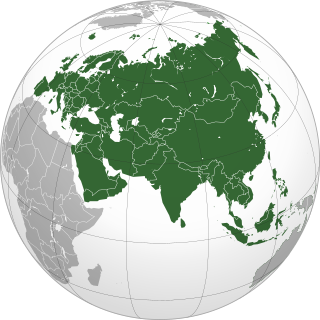 W
WEurasianism is a political movement in Russia that posits that Russian civilisation does not belong in the "European" or "Asian" categories but instead to the geopolitical concept of Eurasia. Originally developing in the 1920s, the movement was supportive of the Bolshevik Revolution but not its stated goals of enacting communism, seeing the Soviet Union as a stepping stone on the path to creating a new national identity that would reflect the unique character of Russia's geopolitical position. The movement saw a minor resurgence after the collapse of the Soviet Union at the end of the 20th century, and is mirrored by Turanism in Turkic and Finnic nations.
 W
WEurope a Nation was a policy developed by the British fascist politician Oswald Mosley as the cornerstone of his Union Movement. It called for the integration of Europe into a single political entity. Although the idea failed to gain widespread support for the Union Movement, it proved highly influential on European far-right thought.
 W
WGuillaume Faye was a French journalist, writer, and leading member of the French New Right. Earlier in his career, anti-Zionism permeated his work; later on, criticism of Islam became prominent in his writings.
 W
WThe Fédération d'action nationale et européenne (FANE) was a small French far-right neo-Nazi organisation founded in April 1966. It was led by Mark Fredriksen, a bank employee who became involved in activism for French Algeria after serving in the paras (paratroopers) there. FANE brought together three movements: Action-Occident, the Cercle Charlemagne and the Comité de soutien à l'Europe réelle.
 W
WThe French and European Nationalist Party was a French far-right neo-Nazi militant organization active between 1987 and 1999. Led by Claude Cornilleau until 1996, its slogan was "France first, white always". It had around a thousand sympathizers at its height.
 W
WThe French National-Collectivist Party, originally known as the French National Communist Party, was a minor political group active in the French Third Republic and reestablished in occupied France. Its leader in both incarnations was the sports journalist Pierre Clémenti. It espoused a "national communist" platform noted for its similarities with fascism, and popularized racial antisemitism. The group was also noted for its agitation in support of Pan-European nationalism and rattachism, maintaining contacts in both Nazi Germany and Wallonia.
 W
WThe French Nationalist Party, is a far-right neo-fascist political movement established in 1983 by former National Front (FN) and Waffen-SS members around the magazine Militant. Inactive after the early 1990s, it was reactivated in 2015 following the dissolution of the néo-Pétainist movement L'Œuvre Française by the French authorities in 2013.
 W
WLes Identitaires, formerly the Bloc identitaire, is an Identitarian nationalist movement in France. Like the French New Right, scholars generally consider the movement far-right or sometimes as a syncretic mixture of multiple ideologies across the political spectrum.
 W
WThe Identitarian movement or Identitarianism is a pan-European nationalist, far-right political ideology asserting the right of Europeans and peoples of European descent to culture and territories claimed to belong exclusively to them. Originating in France as Les Identitaires, with its youth wing Generation Identity, the movement expanded to other European countries during the early 21st century. Building on ontological ideas of modern German philosophy, its ideology was formulated from the 1960s onward by essayists such as Alain de Benoist, Dominique Venner, Guillaume Faye and Renaud Camus, who are considered the movement's intellectual leaders.
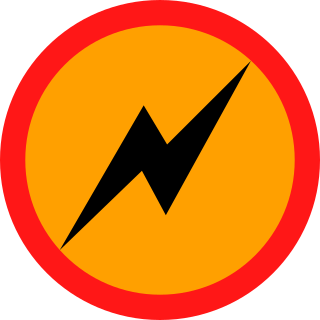 W
WImperium Europa is a far-right Maltese political party, founded in 2000 by Norman Lowell, who is also its leader. Its primary aim is to unite Europe into one political entity.
 W
WNicolae Iorga was a Romanian historian, politician, literary critic, memoirist, poet and playwright. Co-founder of the Democratic Nationalist Party (PND), he served as a member of Parliament, President of the Deputies' Assembly and Senate, cabinet minister and briefly (1931–32) as Prime Minister. A child prodigy, polymath and polyglot, Iorga produced an unusually large body of scholarly works, establishing his international reputation as a medievalist, Byzantinist, Latinist, Slavist, art historian and philosopher of history. Holding teaching positions at the University of Bucharest, the University of Paris and several other academic institutions, Iorga was founder of the International Congress of Byzantine Studies and the Institute of South-East European Studies (ISSEE). His activity also included the transformation of Vălenii de Munte town into a cultural and academic center.
 W
WJeune Europe was a euro-nationalist movement formed by Jean Thiriart in Belgium. Emile Lecerf, a later editor of the Nouvel Europe Magazine, was one of Thiriart's associates.
 W
WJean Mabire, was a French journalist and essayist. A neo-pagan and nordicist, Mabire is known for the regionalist and euro-nationalist ideas he developed in both Europe-Action and GRECE, as well as his controversial books on the Waffen-SS.
 W
WSir Oswald Ernald Mosley, 6th Baronet was a British politician who rose to fame in the 1920s as a Member of Parliament and later in the 1930s, having become disillusioned with mainstream politics, became the leader of the British Union of Fascists (BUF).
 W
WNational Bolshevism, whose supporters are known as National Bolsheviks or NazBols, is a radical political movement that combines ultranationalism and communism.
 W
WThe National Council of European Resistance is a France-based pan-European far-right political organization co-founded by Renaud Camus and Karim Ouchikh on 9 November 2017 by analogy to the National Council of the Resistance. It has links to the identitarian movement.
 W
WThe National Party of Europe (NPE) was an initiative undertaken by a number of political parties in Europe during the 1960s to help increase cross-border co-operation and work towards European unity. Under the direction of Oswald Mosley, a pre-war British fascist leader who returned to politics after the Second World War, the group aimed to bring together and merge a number of far-right groups from across the continent, all of which shared at least some commitment to a wider pan-European nationalism. The group failed to achieve its aims as most of its member groups preferred to maintain their independence.
 W
WThe International Paneuropean Union, also referred to as the Paneuropean Movement and the Pan-Europa Movement, is the oldest European unification movement. It began with the publishing of Count Richard von Coudenhove-Kalergi's manifesto Paneuropa (1923), which presented the idea of a unified European State. Coudenhove-Kalergi, a member of the Bohemian Coudenhove-Kalergi family and the son of an Austro-Hungarian diplomat and a Japanese mother, was the organisation's central figure and President until his death in 1972.
 W
WThe Parti communautaire national-européen (PCN) is a Belgium-based political organisation led by Luc Michel, a former member of the neo-Nazi FANE party. A largely National Bolshevik movement, it also has activists in France.
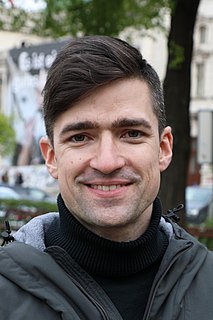 W
WMartin Michael Sellner is a far-right Austrian Neue Rechte and Identitarian activist, and leader of the Identitäre Bewegung Österreichs.
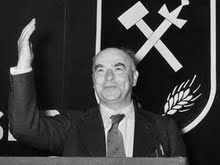 W
WOtto Johann Maximilian Strasser was a German politician and an early member of the Nazi Party. Otto Strasser, together with his brother Gregor Strasser, was a leading member of the party's left-wing faction, and broke from the party due to disputes with the dominant Hitlerite faction. He formed the Black Front, a group intended to split the Nazi Party and take it from the grasp of Hitler. This group also functioned during his exile and World War II as a secret opposition group.
 W
WDominique Venner was a French historian, journalist and essayist. Venner was a member of the Organisation armée secrète and later became a European nationalist, founding Europe-Action, before withdrawing from politics to focus on a career as a historian. He specialized in military and political history. At the time of his death, he was the editor of the La Nouvelle Revue d'Histoire, a bimonthly history magazine. On 21 May 2013, Venner committed suicide inside the cathedral of Notre Dame de Paris.